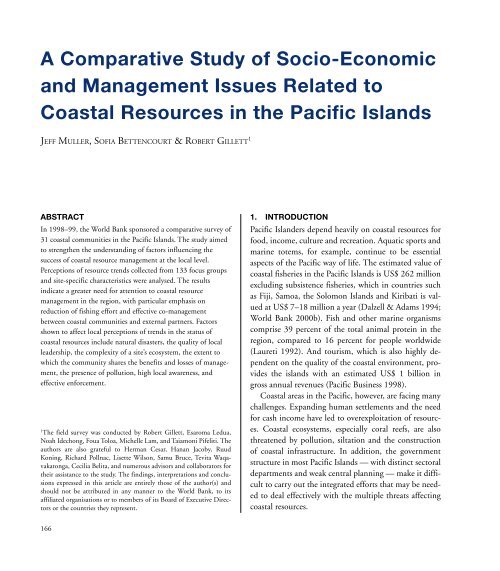You also want an ePaper? Increase the reach of your titles
YUMPU automatically turns print PDFs into web optimized ePapers that Google loves.
A Comparative Study <strong>of</strong> Socio-Economic<br />
and Management Issues Related to<br />
Coastal Resources in the Pacific Islands<br />
JEFF MULLER, SOFIA BETTENCOURT & ROBERT GILLETT 1<br />
ABSTRACT<br />
In 1998–99, the World Bank sponsored a comparative survey <strong>of</strong><br />
31 coastal communities in the Pacific Islands. The study aimed<br />
to strengthen the understanding <strong>of</strong> factors influencing the<br />
success <strong>of</strong> coastal resource management at the local level.<br />
Perceptions <strong>of</strong> resource trends collected from 133 focus groups<br />
and site-specific characteristics were analysed. The results<br />
indicate a greater need for attention to coastal resource<br />
management in the region, with particular emphasis on<br />
reduction <strong>of</strong> fishing effort and effective co-management<br />
between coastal communities and external partners. Factors<br />
shown to affect local perceptions <strong>of</strong> trends in the status <strong>of</strong><br />
coastal resources include natural disasters, the quality <strong>of</strong> local<br />
leadership, the complexity <strong>of</strong> a site’s ecosystem, the extent to<br />
which the community shares the benefits and losses <strong>of</strong> management,<br />
the presence <strong>of</strong> pollution, high local awareness, and<br />
effective enforcement.<br />
1<br />
The field survey was conducted by Robert Gillett, Esaroma Ledua,<br />
Noah Idechong, Foua Toloa, Michelle Lam, and Taiamoni Pifeliti. The<br />
authors are also grateful to Herman Cesar, Hanan Jacoby, Ruud<br />
Koning, Richard Pollnac, Lisette Wilson, Samu Bruce, Tevita Waqavakatonga,<br />
Cecilia Belita, and numerous advisors and collaborators for<br />
their assistance to the study. The findings, interpretations and conclusions<br />
expressed in this article are entirely those <strong>of</strong> the author(s) and<br />
should not be attributed in any manner to the World Bank, to its<br />
affiliated organisations or to members <strong>of</strong> its Board <strong>of</strong> Executive Directors<br />
or the countries they represent.<br />
1. INTRODUCTION<br />
Pacific Islanders depend heavily on coastal resources for<br />
food, income, culture and recreation. Aquatic sports and<br />
marine totems, for example, continue to be essential<br />
aspects <strong>of</strong> the Pacific way <strong>of</strong> life. The estimated value <strong>of</strong><br />
coastal fisheries in the Pacific Islands is US$ 262 million<br />
excluding subsistence fisheries, which in countries such<br />
as Fiji, Samoa, the Solomon Islands and Kiribati is valued<br />
at US$ 7–18 million a year (Dalzell & Adams 1994;<br />
World Bank 2000b). Fish and other marine organisms<br />
comprise 39 percent <strong>of</strong> the total animal protein in the<br />
region, compared to 16 percent for people worldwide<br />
(Laureti 1992). And tourism, which is also highly dependent<br />
on the quality <strong>of</strong> the coastal environment, provides<br />
the islands with an estimated US$ 1 billion in<br />
gross annual revenues (Pacific Business 1998).<br />
Coastal areas in the Pacific, however, are facing many<br />
challenges. Expanding human settlements and the need<br />
for cash income have led to overexploitation <strong>of</strong> resources.<br />
Coastal ecosystems, especially coral reefs, are also<br />
threatened by pollution, siltation and the construction<br />
<strong>of</strong> coastal infrastructure. In addition, the government<br />
structure in most Pacific Islands — with distinct sectoral<br />
departments and weak central planning — make it difficult<br />
to carry out the integrated efforts that may be needed<br />
to deal effectively with the multiple threats affecting<br />
coastal resources.<br />
166


















